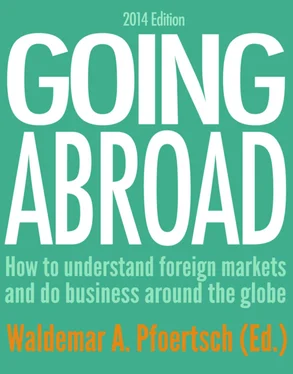Going abroad
How to understand foreign markets and do business around the globe
Waldemar Pförtsch (Ed.)
With 10 Figures and 4 Tables
Editor
Waldemar Pfoertsch
Professor International Business
Pforzheim University
Tiefenbronnerstrasse 65
75175 Pforzheim Germany
Waldemar.pfoertsch@hs-pforzheim.de
Copy Editors
Carla Melo
Karin Herrlin
Michaela Mendes
Chief Editor
Yvonne Krepper
Marion Park
Graphic design and layout
Juliane Rafaela Zierbus
ISBN 978-3-7375-2877-1
Catalog-in-Publication Data
This work is subject to copyright. All rights are reserved, whether the whole or part of the material is concerned, specifically the rights of translation, reprinting, reuse of illustrations, recitation, broadcasting, reproduction on microfilm or in any other media. Duplications of the publication or parts thereof is permitted only under the provision of the German copyright law from September 1063, in its current version, and permission for use must always be obtained from the editor. Violations are liable for prosecution under the German Copyright Law.
© Waldemar Pfoertsch www.pfoertsch.com
The use of general descriptive names, registered names, trademarks, etc. in this publication does not imply, even in the absence of a specific statement, that such names are exempt from the relevant protective laws and regulations and therefore free for general use.
Cover design: Anna Pfoertsch, Wellesley, MA, USA.
Understanding foreign culture is essential for all business people around globe. With this publication, managers and students who potentially want or need to do business in foreign countries are provided with a “how to do manual”. This book actually encourages new managers to prepare for this step and make them more sensible about potential pitfalls and lost opportunities.
The reader will learn about:
How to understand your own culture and how to behave when dealing with others
How to make things happen abroad
How to sell to foreigners
How to win a bargain
How to understand each other in international teams
How to get along with the bosses at home
How to get the best performance out of your employees
How to teach in a foreign Country
What it takes to be a winner
Here the reader can get guidelines for Business and Social Etiquette. He can learn a lot about international ways of doing business, and understand Business and Social Etiquette in various countries.
This publication gives also valuable advice, how deal with the company headquarters, when you are abroad and how to balance your social life in the foreign environment. It is written from a global perspective and answers questions, which many have learned the hard way. After reading this small booklet the reader will have a much easier way to participate on the rapid growth of international business.
Waldemar Pförtsch Stuttgart/Shanghai 2014
Preface Preface Understanding foreign culture is essential for all business people around globe. With this publication, managers and students who potentially want or need to do business in foreign countries are provided with a “how to do manual”. This book actually encourages new managers to prepare for this step and make them more sensible about potential pitfalls and lost opportunities. The reader will learn about: How to understand your own culture and how to behave when dealing with others How to make things happen abroad How to sell to foreigners How to win a bargain How to understand each other in international teams How to get along with the bosses at home How to get the best performance out of your employees How to teach in a foreign Country What it takes to be a winner Here the reader can get guidelines for Business and Social Etiquette. He can learn a lot about international ways of doing business, and understand Business and Social Etiquette in various countries. This publication gives also valuable advice, how deal with the company headquarters, when you are abroad and how to balance your social life in the foreign environment. It is written from a global perspective and answers questions, which many have learned the hard way. After reading this small booklet the reader will have a much easier way to participate on the rapid growth of international business. Waldemar Pförtsch Stuttgart/Shanghai 2014
Introduction
International Ways of Doing Business
How to understand your own culture and how to behave when dealing with others
Getting Started
How to make things happen abroad?
Marketing
How to sell to foreigners?
Negotiation
How to win a bargain?
Communication across cultural and language barriers
How to understand each other? Melanie Reithmeier, Nina Schaffarczyk, Susanne Brückner
Managing People Abroad
How do I get the best performance out of my employees?
Going International, Transferring Skills and Training
How to teach in a foreign country?
Business and Social Etiquette
Guidelines to business and social etiquette
Getting things done
Making the machinery work
Dealing with the Headquarters
How to get along with the bosses at home
Managing your personal and family life
Guidelines to work life balance
The Road to Success
What does it take to be a winner?
About authors and the editor
The editor
Waldemar Pförtsch
One of the most significant trends in the economic world in the past decades has been the rapid growth of international business. Markets have become the battle ground for companies from all over the world, and we talk today about the globally interconnected world. Markets have become truly global for consumer and business-to-business goods, many services and financial instruments of all types. This has not only created opportunities, but also expanded the risk and vulnerability of local markets. The importance of understanding the international business environment and the difference that might exist in the business environment in the domestic and international contexts becomes an important asset for small and large companies in all places of the world.
As everybody knows, we live in economic difficult times and may enter into an entirely new era, an age of increasingly frequent and intense periods of turbulence in the global economy. The complete set-up of international relationships is changing on a country and company level. The economic development of the 80s, which led to the establishment of the “Triade”, consisting of the developed nations of the USA, Europe, and Japan have metamorphosed to a kind of “constellation”, including BRIC countries (Brazil, Russia, India, China) and the Next Eleven (N-11) a group of developing countries with great prospects for the future. They consist of Bangladesh, Egypt, Indonesia, Iran, Mexico, Nigeria, Pakistan, Philippines, Turkey, South Korea, and Vietnam.
This “constellation of markets” became the target markets for product and service offerings for companies from around the world. The companies which understand the various market conditions and players will be the ones which will prosper.
Economic globalization began 30 years ago, but it was not widely recognized until recently in the past 15 years. The Organization of Economic Cooperation and Development (OECD) defined economic globalization as an ongoing process. In this process, economic activities, markets, technology and forms of communication are with increasing global characteristics, while the national ones are in decrease.
Читать дальше











